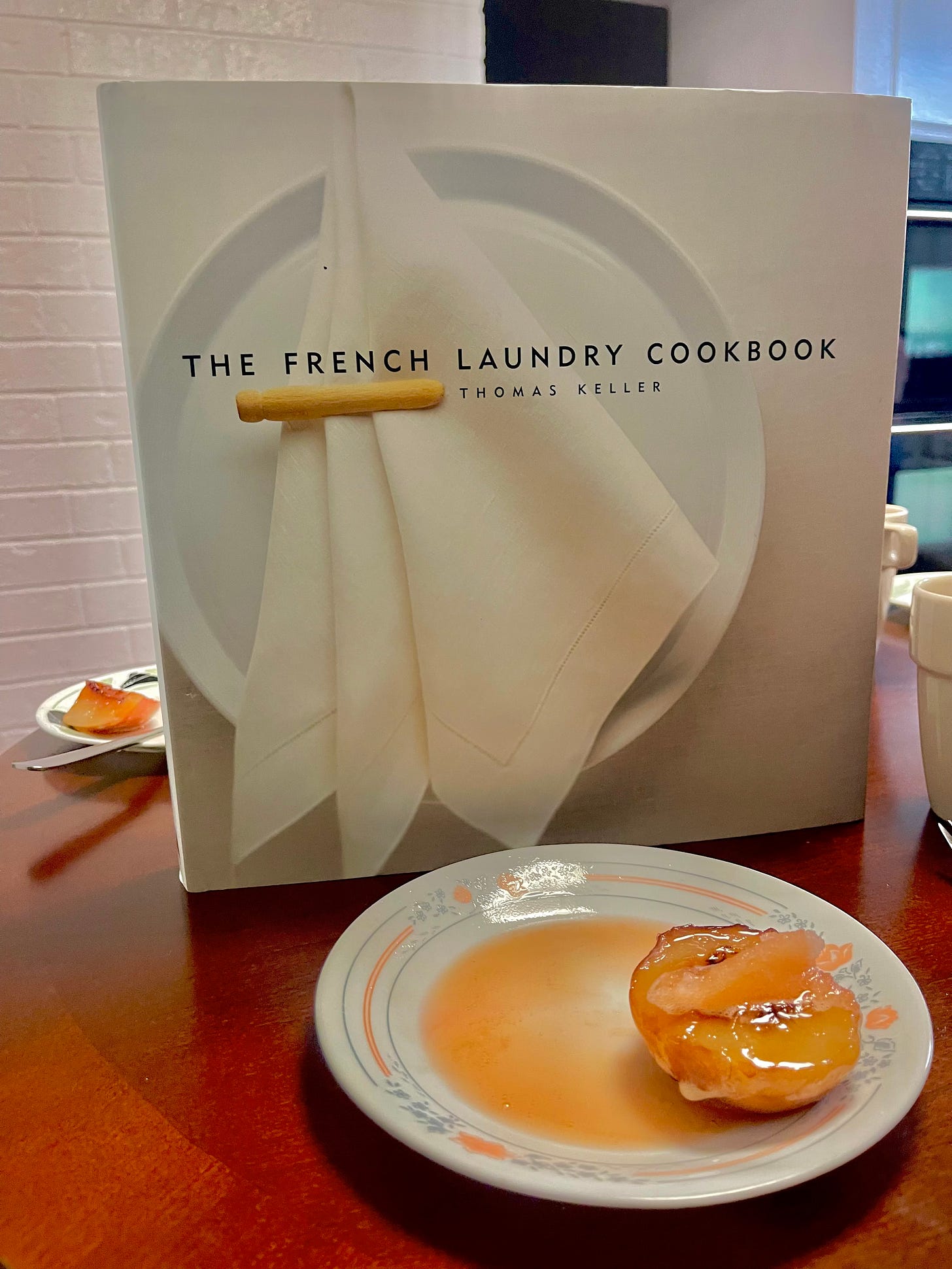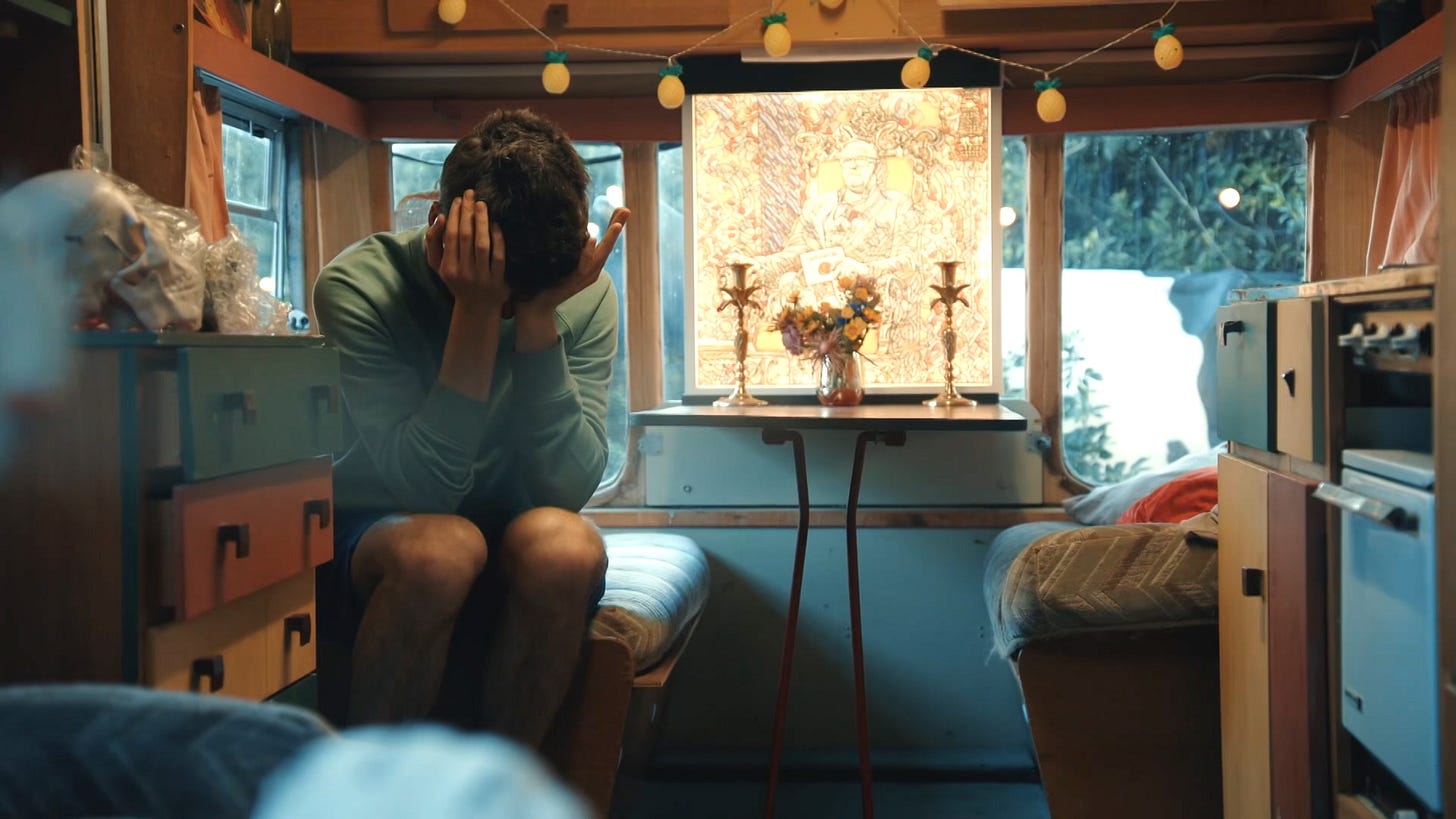Religious Text Might Be a More Accurate Characterization
Initial thoughts on The French Laundry Cookbook (and the story of how I got my copy)
This might sound weird, but despite my love of food and cooking, I’d never owned a cookbook until a month ago.
I suppose that was thanks to growing up with the internet. If I wanted to make something, I’d simply look up recipes online and choose the one that appealed to me. Sure, a cookbook would offer a ton of recipes all at once, but the odds of me cooking every recipe in any cookbook felt low. Some I’d avoid due to lack of interest, but most I’d avoid because of sheer lack of skill. And that’s not counting the ones I’d avoid due to the fatal combination of incompetence and repulsion. Why own a cookbook with 100 recipes if I was only ever going to make 30 of them? And if I were going to own a cookbook, starting somewhere simple, like Cooking For Dummies, would probably be the move.
It is quite the twist of fate, then, that I can officially say my very first cookbook is The French Laundry Cookbook—a book The Wall Street Journal deemed “notorious for including some of the most laborious recipes in print.”
Anyone who’s browsed a bookstore with me knows that I make a beeline for the cooking section and start flipping my way through cookbooks. After all, my vow of cookbook-owning celibacy isn’t mutually exclusive to my love of food and desire to discover new recipes. It’s how I found myself face-to-face with The French Laundry Cookbook for the first time in a bookstore in Napa last month. I knew the book existed—it’s been around for 25 years. But until that fateful day, I’d somehow never stumbled across one.
What immediately struck me as I started flipping through the book was how different it was. The long, incredibly detailed recipes and the lack of estimated total cooking time made it feel more like I was reading a textbook rather than a cookbook. Though, considering The French Laundry’s legendary status, religious text might be a more accurate characterization. I wasn’t the only one who felt that way. Another guy browsing cookbooks took one look at the book I had opened in front of me and immediately recognized it.
“The French Laundry Cookbook? That’s a really great one.”
“Yeah,” I answered, nodding.
The more I read, the more it felt unlike any other cookbook I’d seen. No other cookbook I’d read before had bothered explaining in detail the techniques behind each recipe and why they were so important. And while other cookbooks also delve into detail about the chef’s personal culinary journey, The French Laundry Cookbook goes a step beyond by including stories of the suppliers that help make The French Laundry a gastronomic giant. This really stood out to me. It would’ve been easy in this case for all the focus to be on Chef Thomas Keller, and no one would’ve complained if that had been the case. But food is a cornerstone of all our lives and, therefore, is about so much more than a singular person. The acknowledgement of that by someone who could definitely get away with making it all about themselves is admirable.
I decided at that point to buy the book, cookbook-owning celibacy be damned. Would the recipes be incredibly time-consuming and complicated? Probably. But these are recipes from one of the world’s most famous restaurants—I’d be disappointed if they weren’t. Plus, I was curious to learn more about the restaurant, and I knew I could use the techniques taught in the book elsewhere. After a few more minutes of flipping through other cookbooks while still clutching The French Laundry Cookbook (a task more difficult than it sounds, given its size), I was ready to check out when, all of a sudden:
“Let me get that for you.” It was the guy from earlier.
I was confused. He must be speaking to someone else, or I must have misheard him, I thought.
Seeing my confusion and lack of response, he repeated the offer.
“No, it’s okay,” I replied. “That’s really kind of you, but I can’t possibly let you do that.”
“No, it’s okay—I work at The French Laundry.”
WHAT.
Luckily, the guy took my stunned silence as a signal that I was willing to accept his offer rather than for what it really was (a full-blown brain malfunction). Next thing I knew, I was thanking him on repeat while still trying to process what was happening. We made some small talk while waiting in line, and he left after paying for the book, leaving me still shell-shocked over what had just happened. In fact, the moment still feels slightly surreal a month later.
The main conclusion I’ve reached in the first month I’ve owned The French Laundry Cookbook is that the book has transcended and redefined my view of what a cookbook could (and should) be. Yes, you could buy it just for the recipes. But if what you’re looking for in a cookbook is something that’ll help you decide what to cook on a weeknight, this isn’t for you. This is firmly a “special occasion” cookbook. But that doesn’t mean it has no practical value—and by “practical,” I don’t mean being one of those nice books you put on a coffee table either. The book is a masterclass on cooking techniques and understanding flavor. The full recipes may be way too time-consuming and involved when viewed as a whole, but the individual components that make up the dish are incredibly versatile. Even if you don’t prepare an entire dish, the book’s various stocks and oils are all ways to elevate anything you cook. Most importantly, all of them are relatively easy to make.
Ok, maybe not all of them. Where am I supposed to get *checks recipe* 10 pounds(!) of venison bones for venison stock?
When there is a special occasion, though, I highly recommend you try some of the recipes in the book. And in true Omakase Formula style, the first “special occasion” was none other than the start of the F1 season (and not just any season either—it’s the 75th!). I wanted to have a small party to launch the season, and it was only fitting that the world’s most extravagant sport (this week’s opener is officially called the “Formula 1 Louis Vuitton Australian Grand Prix 2025”) be celebrated with the most extravagant dinner that I could attempt to make.
I’ll be documenting my thoughts on each dish I made for the dinner (as well as thoughts on any future dish I make from the book) in subsequent Omakase Formula posts, so stay tuned for that. This isn’t a commitment to making every dish in the cookbook—I want my focus when cooking these recipes to be on refining my own cooking and expanding my knowledge of food instead of trying to say I’ve cooked every dish this book has to offer. Plus, there are some ingredients that are incredibly hard to buy, despite Chef Keller kindly discussing where The French Laundry sources them. The two pages on John Mood, the purveyor who supplies The French Laundry with hearts of palm, were wonderful, but I’m not sure I’ll ever find myself tackling the accompanying two-page recipe.
You’ll also find, over the next few posts, that while I try to stick to the recipe as written in the book, I’ll also be making some revisions. As Chef Keller points out, making these dishes isn’t about duplicating what is served at The French Laundry. Going into the process with that goal will only set you up for failure. The goal, as he writes, is “to create something that you have deep respect and feelings and passions for.” The recipes are there to act as guidelines—something akin to the outlines in a coloring book. How you go about the details, much like the colors you choose to fill in the outline, is entirely up to your discretion. So you can bet that, as someone with an aversion to garlic that is borderline vampiric, none of the recipes I selected for the dinner called for it. But even if one had, there was no way I was going to sacrifice my own personal principle in the name of following the recipe. And I’d be shocked if The French Laundry had a recipe that absolutely could not function without garlic.
There were definitely moments over the course of making dinner where I felt (or even looked) like this legendary moment from Ivo Graham on Series 15 of Taskmaster (you should watch this entire compilation, but jump to 8:49 for the moment I’m referencing):
At one point, I’d even texted my friends—who were aware I was planning to cook, but unaware of just how ambitious I wanted to be with my cooking—to be excited for dinner because if all else failed we’d just go to In-n-Out. But at the end of it all, I found myself really pleased with the overall result and proud that I’d gone through with my plan and not succumbed to the temptation of convenience offered by In-n-Out. And, crucially, everyone loved all the dishes, and no one went home hungry.
Chef Keller writes in the book that any meal cooked by the reader can be “more satisfying than anything I could ever make for you.” I suppose that depends on how he defines “satisfying.” From a purely taste perspective, I’d disagree. There is no way a mere home cook like me could obtain the highest quality ingredients The French Laundry has access to. And even if I could, there’s no way I could match the execution of the chefs there. But from an experience perspective, perhaps he has a point. While I’m sure dining at The French Laundry is incredible, the joy of spending an evening with some close friends and seeing the fruits of my labor is on a completely different level.
What I’m trying to say is, I’m incredibly grateful my first cookbook wasn’t Cooking For Dummies.
A final note:
The odds of him seeing this are next to none, but on the .001% chance that he somehow does, I want to thank Trey at The French Laundry again. I’ve sometimes wondered what prompted him to buy the book for me, and when I replay that moment in my head, I keep thinking my surprise made me painfully awkward and unable to properly thank him. But I know the reason doesn’t matter. I am forever grateful, and I hope he’ll know his act of kindness didn’t go to waste.






